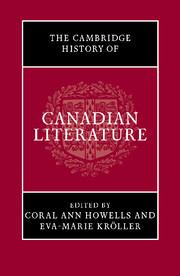Book contents
- Frontmatter
- Introduction
- PART ONE OLD AND NEW WORLD, LA NOUVELLE-FRANCE, THE CANADAS, DOMINION OF CANADA
- PART TWO THE POST-CONFEDERATION PERIOD
- PART THREE MODELS OF MODERNITY, POST-FIRST WORLD WAR
- PART FOUR AESTHETIC EXPERIMENTS, 1960 AND AFTER
- 18 Quartet: Atwood, Gallant, Munro, Shields
- 19 The short story
- 20 Canadian drama: performing communities
- 21 Poetry
- 22 Poetry, drama, and the postmodern novel
- 23 Comic art and bande dessinée: from the funnies to graphic novels
- 24 “Ghost stories”: fictions of history and myth
- 25 Indigenous writing: poetry and prose
- 26 Contemporary Aboriginal theater
- 27 Transcultural life-writing
- 28 Multiculturalism and globalization
- PART FIVE WRITING IN FRENCH
- Bibliography
- Index
- References
19 - The short story
from PART FOUR - AESTHETIC EXPERIMENTS, 1960 AND AFTER
Published online by Cambridge University Press: 28 September 2010
- Frontmatter
- Introduction
- PART ONE OLD AND NEW WORLD, LA NOUVELLE-FRANCE, THE CANADAS, DOMINION OF CANADA
- PART TWO THE POST-CONFEDERATION PERIOD
- PART THREE MODELS OF MODERNITY, POST-FIRST WORLD WAR
- PART FOUR AESTHETIC EXPERIMENTS, 1960 AND AFTER
- 18 Quartet: Atwood, Gallant, Munro, Shields
- 19 The short story
- 20 Canadian drama: performing communities
- 21 Poetry
- 22 Poetry, drama, and the postmodern novel
- 23 Comic art and bande dessinée: from the funnies to graphic novels
- 24 “Ghost stories”: fictions of history and myth
- 25 Indigenous writing: poetry and prose
- 26 Contemporary Aboriginal theater
- 27 Transcultural life-writing
- 28 Multiculturalism and globalization
- PART FIVE WRITING IN FRENCH
- Bibliography
- Index
- References
Summary
In 1965, recognizing that publishers had released relatively few short story collections during the previous decade, the Literary History of Canada predicted that the genre was dying. Instead, short fiction thrived, copious and flexible. By the first decade of the twenty-first century approximately fifty collections were appearing every year, the increase in numbers coinciding with social growth, changes in the means of production, and extended critical attention. While markets for the genre remained fragile, short fiction nevertheless became more visible and more varied, with publishers seeking further ways to attract commercial attention and new writers keen to address readers in a different manner and voice. New stories ranged widely in subject and form: from Alice Munro’s Altmanesque collections, where western Ontario radiates into story-making, to Rohinton Mistry’s layered sequence set in Toronto and Bombay; from Alistair MacLeod’s memorializing Cape Breton cadences to the serious comedy of Austin Clarke and Thomas King; from Mavis Gallant’s and Guy Vanderhaeghe’s dances with temporality to the rhetorical adventures of Audrey Thomas, Tamas Dobozy, Mark Anthony Jarman, Douglas Glover, Thomas Wharton, and Lisa Moore. Numerous writers, such as Nancy Lee, Rachel Wyatt, Jack Hodgins, and Bill Gaston, dramatized the particularity of gender, place, and social politics. Some, such as Olive Senior, Adam Lewis Schroeder, and Joseph Boyden, focused on issues relating to ethnic and colonial history. Still others – among them Elizabeth Brewster, Kristjana Gunnars, Timothy Findley, Barry Dempster, Ken Mitchell, Mark Frutkin, and David Watmough – established their primary reputation with their poems, plays, or novels, but also published noteworthy collections of stories. The history of the genre during these decades thus demonstrates a series of differing designs, due in part to radical changes in technology, strategic developments in the publishing industry, and the emergence of succeeding generations of writers, all coping with the demands of the medium and the institutions of communication, and eager to express their understanding of their own time in the world.
- Type
- Chapter
- Information
- The Cambridge History of Canadian Literature , pp. 381 - 401Publisher: Cambridge University PressPrint publication year: 2009
References
- 1
- Cited by



